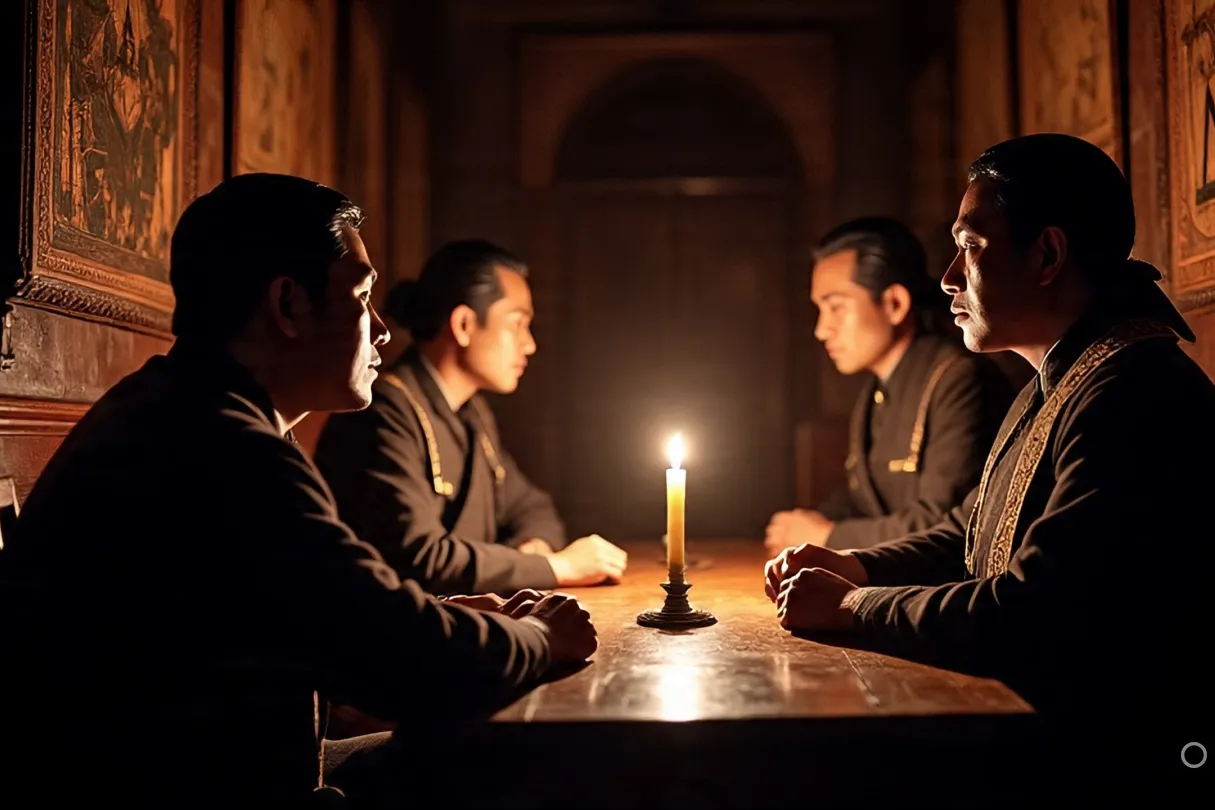🕰️ Before the Nation: Lodges, Triads, and Early Influence
In the 19th century, long before Singapore became a modern metropolis, its underworld was already thriving. Chinese secret societies—part brotherhood, part gang—played a dual role: protectors of migrant communities and enforcers of shadow justice.
- 🕰️ Before the Nation: Lodges, Triads, and Early Influence
- 🔺 The Freemason Lodges: Symbolism, Power, and Perception
- 💣 Crackdown on Chinese Secret Societies
- 🔄 Transition Into Independence: Did the Shadows Stay?
- 🧠 Colonial Fear vs. Local Realities
- 🧩 The Legacy Today: Are the Shadows Gone?
- 🔍 A Final Reflection on Secrecy and Power
⛩️ Known as hui or kongsi, these groups emerged from China, where they operated in resistance to the Qing dynasty. In Singapore, they filled a social vacuum left by British neglect of migrant welfare. Organizations like the Ghee Hin and Hai San held sway over neighborhoods, docks, and even funerals.
Meanwhile, British colonial officials were more focused on law and order—but many were themselves members of another secretive network: the Freemasons.
🔍 This created an odd duality—while Chinese secret societies were criminalized, British-led Masonic lodges thrived openly in elite circles.
🔺 The Freemason Lodges: Symbolism, Power, and Perception
Freemasonry came to Singapore via British officials and businessmen. The first Masonic lodge—The Zetland in the East—was established in 1845, and attracted the island’s colonial elite.
📜 With cryptic rituals, esoteric symbols, and exclusive membership, Masonic lodges were viewed with suspicion by locals. But in truth, they served more as elite clubs than political puppet-masters.
Still, the secrecy fueled rumor:
- Were policies quietly coordinated behind lodge doors?
- Did British governance favor fellow Masons in trade and judiciary roles?
- Was there a hidden global fraternity shaping Southeast Asia?
👁️ Conspiracy theorists link Freemasonry to everything from colonial expansion to spiritual manipulation. But historians argue that in Singapore, Masons were less about mind control and more about mutual networking among the powerful.
💣 Crackdown on Chinese Secret Societies
The British didn’t hesitate to criminalize Chinese secret societies. Following frequent gang clashes, the Societies Ordinance of 1869 outlawed most of them.
🚨 Reasons for suppression included:
- Public violence and turf wars
- Tax evasion and extortion
- Fear of rebellion or political mobilization
But beneath these practical reasons lay racial bias and colonial paranoia. The British saw Chinese societies not as complex socio-political networks—but as threats to their fragile control.
📢 This crackdown forced many secret societies underground, where they mutated into triads—organized crime groups dealing in gambling, drugs, and human trafficking.
🔄 Transition Into Independence: Did the Shadows Stay?
As Singapore moved toward independence, many wondered whether secret societies—especially those rebranded as business clans or cultural groups—had embedded themselves in the new establishment.
👥 Rumors persisted:
- Former triad leaders funding political parties
- Masonic influence over early governance structures
- Lodge members quietly occupying key bureaucratic posts
📊 But solid evidence is thin. Unlike Western democracies where lobby groups are regulated, Singapore’s political funding and backroom dynamics remain largely opaque.
Historians argue that if secret societies did influence policy, it was through soft power—not overt control. They offered networks, votes, and money—not master plans.
🧠 Colonial Fear vs. Local Realities
Colonial accounts often exaggerated the power of secret societies, painting them as omnipresent threats. But modern scholars argue these fears said more about British insecurity than actual conspiracies.
📚 Historian Carl Trocki noted that colonial narratives created a binary: British freemasonry as civilized order vs. Chinese brotherhoods as dangerous chaos.
In reality:
- Some societies genuinely helped migrants survive
- Others turned to crime under colonial repression
- British officials used secret society hysteria to justify authoritarian control
🧩 The Legacy Today: Are the Shadows Gone?
Today, secret societies in Singapore exist more as folklore and cautionary tales. The government has maintained a zero-tolerance policy against gangs and criminal fraternities.
🏛️ Masonic lodges still exist, but their influence is negligible. Once elite, they’re now obscure to most Singaporeans.
However, the cultural memory of secrecy, control, and suspicion lingers:
- Films and literature romanticize secret societies
- Older generations still whisper about gang tattoos and coded language
- Modern political transparency remains a work in progress
🔍 A Final Reflection on Secrecy and Power
Were secret societies and Masonic lodges truly puppet masters of Singapore’s past? Or were they convenient symbols in a struggle between colonial order and grassroots resilience?
🌘 Perhaps both are true in part. What’s certain is that power often hides in plain sight—wrapped in ceremony, protected by loyalty, and sustained by myth.
Singapore’s story, like all nations, has its shadows. To understand them isn’t to fear them—but to ask who benefits from secrecy, and why some stories remain half-told.




